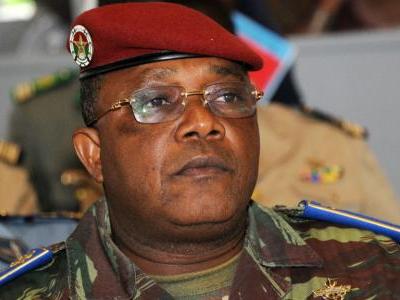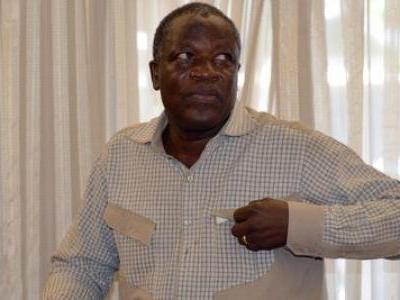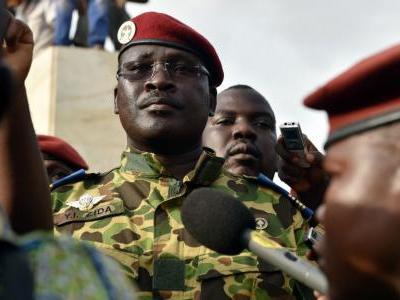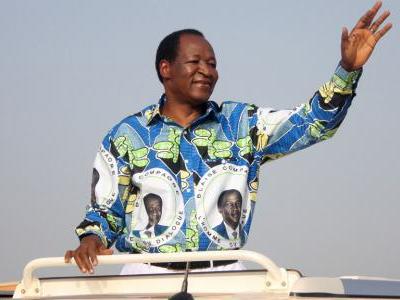Sat, 11/01/2014 - 16:51
Two days, three leaders and a tricky transition for Burkina Faso
The morning after Burkina Faso strongman Blaise Compaore resigned, the West African nation woke up Saturday to three possible leaders, two rival claims to power by military men -- which was resolved when the junior officer won the round -- and a lot of uncertainty over the transition process.
On Friday afternoon, with tens of thousands of protesters still packed on Place de la Nation and outside the army headquarters in the capital of Ouagadougou, Burkina Faso’s military chief of staff General Honore Traore announced he was taking on the responsibilities of head of state.

Traore’s declaration came shortly after Compaore’s resignation statement was released, with local rumor mills still buzzing about the former president’s whereabouts.
Compaore’s exit after 27 years in power marked a historic change in the history of this impoverished West African nation, which consistently sits in the bottom ranks of the UN Human Development Index. In the end, it was the 63-year-old strongman’s decision to extend his term limit that brought about his downfall.
As a popular uprising swept through the tiny, landlocked country, opposition supporters took to the streets calling for a retired general and former defense minister, Kouame Lougue, to take control, with cries of "Lougue in power!"

A former defense minister who fell out with Compaore in 2003, Lougue was widely seen as a credible replacement – unlike Traore, who is considered too close to the ousted president.
Clear up the streets if not the political situation
But by early Saturday, a third name was thrown into the leadership ring when a relatively unknown military officer, Lieutenant Colonel Isaac Zida, declared himself in charge and dismissed Traore’s claim as “obsolete”.

As Ouagadougou woke up Saturday to a new political reality, they were being urged back on the streets -- not to protest, but to clean up the roads after two days of mass demonstrations.
Armed with mops and brooms, Ouagadougou Mayor Simon Compaore led volunteers on “Operation Mana Mana” (or Operation Clean-Clean in the local Dyula language) as they cleared the streets, earning praise on social media sites.

“There are no protests downtown. The people are now busy cleaning the streets. That means that people are now okay to be led by Lieutenant Colonel Zida,” said GRN correspondent Louis Oulon in a phone interview with FRANCE 24 from Ouagadougou. “There were talks overnight and it seems to be Zida who is the new president of Burkina Faso…actually Honore [Traore] is no longer the president because Zida has the support, the men with him.”
By mid-afternoon, Zida appeared to have won the backing of not just his military men, but also the country’s top general, who had staked his own claim to power barely 24 hours ago.
In a statement signed by Gen. Traore, the country’s top military chiefs noted that Zida “had been elected unanimously to lead the transition period opened after the departure of President Blaise Compaore.”
The declaration of support for Zida, which sidelined the military chief of staff, was issued after a meeting of top military chiefs in Ouagadougou on Saturday.
Meanwhile the government of Ivory Coast finally put an end to a 48-hour rumour cycle on Compaore’s whereabouts when Ivorian President Alassane Ouattara confirmed that the former Burkinabe president had arrived in Ivory Coast, which shares a 580-kilometer border with Burkina Faso and where Compaore is credited with playing a key role in the 2011 peace process.
But the uncertainty over the next steps in the transition process has not cleared with thousands taking to the streets again on Sunday to protest what they call a military coup and a hijacking of their revolution.
Where is Article 43?
In his resignation statement, Compaore declared he was resigning under Article 43 of the constitution, which states that in case of a vacancy of the presidency, elections should be held at least 60 days, or at most 90 days, after the official vacancy declaration. It was a promise Gen. Traore reiterated when he declared himself head of state on Friday.
Some Burkinabe politicians – including the main opposition leader Zephirin Diabre – however have expressed serious doubts about the country’s ability to hold elections within the next three months.
Article 43 also states that the president of the senate should take over after a president resigns, a stipulation that has been clearly ignored, highlighting the power of the military in this tiny West African nation.
“The military in Burkina Faso is very powerful,” said Maja Bovcon, a senior analyst at the UK-based political risk consultancy, Maplecroft. “You should also take into account that Blaise Compaore himself came to power in a military coup [in 1987]. He’s a former officer and he’s also very closely connected to the military. We could describe the regime in Burkina Faso as a kind of mixture of political and military culture. However there are huge divisions – especially between the normal army and the special elite forces.”
Not much is known about Zida before the army man shot into the international spotlight early Saturday. “He was the operational commander of the elite presidential guard, which is the crème de la crème of the army,” said Bovcon. “These are special units that have to be especially loyal to the president, they are better equipped, better paid and they are apart from the rest of the army.”
‘Afraid of his own army’
In the case of Burkina Faso, the divide between regular army and special units was magnified following a series of popular protests in 2011 by soldiers, students, merchants and police officers.
Compaore, a seasoned political player, managed to survive the 2011 protests, which some demonstrators dubbed the “Burkinabe Spring” after the Arab uprisings. He did it by dismissing his government, replacing top army officials and offering higher pay packages to police officials.

Gen. Traore was one of the senior officials appointed after the 2011 uprisings, which put him firmly in the camp of a Compaore loyalist, discrediting his bid for transitional power three years later.
“After the 2011 protests, Blaise Compaore became afraid of his own army,” explained Bovcon. “Soldiers based in Ouagadougou were not properly equipped, but the presidential guards remained well-armed. It’s curious that Isaac Zida, a member of the presidential guards, has become head of this transitional administration. It will be really interesting to see how Isaac Zida will behave in the future and what is his relationship with the opposition.”
While analysts are still digesting the quick series of events that have taken place over the past 48 hours in Burkina Faso, attention in the days and weeks to come is likely to focus on the relationship between the military and opposition leaders. “Given all the quick developments in the past two days, it’s very difficult to know what these alliances could be,” said Bovcon. “They can change very rapidly. For example, Traore appeared to have support in the beginning but suddenly Zida came up as the new transitional leader. Hopefully, this situation will stabilize within a year.”
Until then, the people who defied the odds and managed to oust an entrenched leader will have to be on their guard to ensure that Burkina Faso survives a tenuous transitional process on the path to democracy.
On Friday afternoon, with tens of thousands of protesters still packed on Place de la Nation and outside the army headquarters in the capital of Ouagadougou, Burkina Faso’s military chief of staff General Honore Traore announced he was taking on the responsibilities of head of state.

Traore’s declaration came shortly after Compaore’s resignation statement was released, with local rumor mills still buzzing about the former president’s whereabouts.
Compaore’s exit after 27 years in power marked a historic change in the history of this impoverished West African nation, which consistently sits in the bottom ranks of the UN Human Development Index. In the end, it was the 63-year-old strongman’s decision to extend his term limit that brought about his downfall.
As a popular uprising swept through the tiny, landlocked country, opposition supporters took to the streets calling for a retired general and former defense minister, Kouame Lougue, to take control, with cries of "Lougue in power!"

A former defense minister who fell out with Compaore in 2003, Lougue was widely seen as a credible replacement – unlike Traore, who is considered too close to the ousted president.
Clear up the streets if not the political situation
But by early Saturday, a third name was thrown into the leadership ring when a relatively unknown military officer, Lieutenant Colonel Isaac Zida, declared himself in charge and dismissed Traore’s claim as “obsolete”.

As Ouagadougou woke up Saturday to a new political reality, they were being urged back on the streets -- not to protest, but to clean up the roads after two days of mass demonstrations.
Armed with mops and brooms, Ouagadougou Mayor Simon Compaore led volunteers on “Operation Mana Mana” (or Operation Clean-Clean in the local Dyula language) as they cleared the streets, earning praise on social media sites.

“There are no protests downtown. The people are now busy cleaning the streets. That means that people are now okay to be led by Lieutenant Colonel Zida,” said GRN correspondent Louis Oulon in a phone interview with FRANCE 24 from Ouagadougou. “There were talks overnight and it seems to be Zida who is the new president of Burkina Faso…actually Honore [Traore] is no longer the president because Zida has the support, the men with him.”
By mid-afternoon, Zida appeared to have won the backing of not just his military men, but also the country’s top general, who had staked his own claim to power barely 24 hours ago.
In a statement signed by Gen. Traore, the country’s top military chiefs noted that Zida “had been elected unanimously to lead the transition period opened after the departure of President Blaise Compaore.”
The declaration of support for Zida, which sidelined the military chief of staff, was issued after a meeting of top military chiefs in Ouagadougou on Saturday.
Meanwhile the government of Ivory Coast finally put an end to a 48-hour rumour cycle on Compaore’s whereabouts when Ivorian President Alassane Ouattara confirmed that the former Burkinabe president had arrived in Ivory Coast, which shares a 580-kilometer border with Burkina Faso and where Compaore is credited with playing a key role in the 2011 peace process.
But the uncertainty over the next steps in the transition process has not cleared with thousands taking to the streets again on Sunday to protest what they call a military coup and a hijacking of their revolution.
Where is Article 43?
In his resignation statement, Compaore declared he was resigning under Article 43 of the constitution, which states that in case of a vacancy of the presidency, elections should be held at least 60 days, or at most 90 days, after the official vacancy declaration. It was a promise Gen. Traore reiterated when he declared himself head of state on Friday.
Some Burkinabe politicians – including the main opposition leader Zephirin Diabre – however have expressed serious doubts about the country’s ability to hold elections within the next three months.
Article 43 also states that the president of the senate should take over after a president resigns, a stipulation that has been clearly ignored, highlighting the power of the military in this tiny West African nation.
“The military in Burkina Faso is very powerful,” said Maja Bovcon, a senior analyst at the UK-based political risk consultancy, Maplecroft. “You should also take into account that Blaise Compaore himself came to power in a military coup [in 1987]. He’s a former officer and he’s also very closely connected to the military. We could describe the regime in Burkina Faso as a kind of mixture of political and military culture. However there are huge divisions – especially between the normal army and the special elite forces.”
Not much is known about Zida before the army man shot into the international spotlight early Saturday. “He was the operational commander of the elite presidential guard, which is the crème de la crème of the army,” said Bovcon. “These are special units that have to be especially loyal to the president, they are better equipped, better paid and they are apart from the rest of the army.”
‘Afraid of his own army’
In the case of Burkina Faso, the divide between regular army and special units was magnified following a series of popular protests in 2011 by soldiers, students, merchants and police officers.
Compaore, a seasoned political player, managed to survive the 2011 protests, which some demonstrators dubbed the “Burkinabe Spring” after the Arab uprisings. He did it by dismissing his government, replacing top army officials and offering higher pay packages to police officials.

Gen. Traore was one of the senior officials appointed after the 2011 uprisings, which put him firmly in the camp of a Compaore loyalist, discrediting his bid for transitional power three years later.
“After the 2011 protests, Blaise Compaore became afraid of his own army,” explained Bovcon. “Soldiers based in Ouagadougou were not properly equipped, but the presidential guards remained well-armed. It’s curious that Isaac Zida, a member of the presidential guards, has become head of this transitional administration. It will be really interesting to see how Isaac Zida will behave in the future and what is his relationship with the opposition.”
While analysts are still digesting the quick series of events that have taken place over the past 48 hours in Burkina Faso, attention in the days and weeks to come is likely to focus on the relationship between the military and opposition leaders. “Given all the quick developments in the past two days, it’s very difficult to know what these alliances could be,” said Bovcon. “They can change very rapidly. For example, Traore appeared to have support in the beginning but suddenly Zida came up as the new transitional leader. Hopefully, this situation will stabilize within a year.”
Until then, the people who defied the odds and managed to oust an entrenched leader will have to be on their guard to ensure that Burkina Faso survives a tenuous transitional process on the path to democracy.
Tags for all blogs :
Comments or opinions expressed on this blog are those of the individual contributors only, and do not necessarily represent the views of FRANCE 24. The content on this blog is provided on an "as-is" basis. FRANCE 24 is not liable for any damages whatsoever arising out of the content or use of this blog.




1 Comments
Post new comment